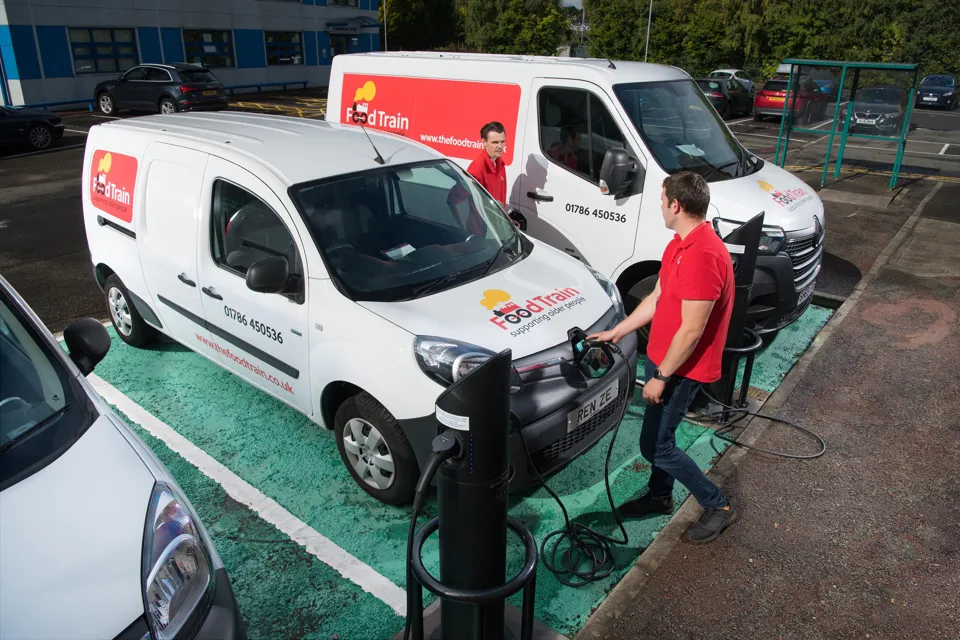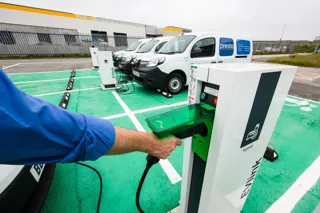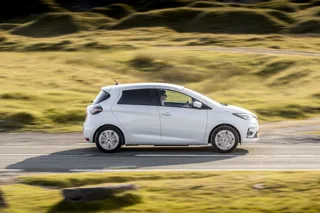The Food Train charity has taken delivery of nine new Renault electric vans, enabling it complete zero-emission deliveries in Scotland.
Six Master ZE and three Kangoo Maxi ZE models were chosen by the charity, which provides grocery deliveries to older people who struggle with mobility.
In addition to its established operations in Dumfries and Galloway, West Lothian, Glasgow, Renfrewshire, Stirling, Dundee and Scottish Borders, and in the latest development in its 25-year history, the charity is now able to expand its coverage to Clackmannanshire and East Renfrewshire.
Michelle Carruthers MBE, CEO of the Food Train, said: “We are delighted that our new vans are allowing us to operate in a more environmentally friendly way and support the Scottish Government’s climate change and air quality targets. However, even without the environmental benefits they make sense for us operationally. They take the constant stopping and starting during our rounds in their stride and the Masters swallow the delivery boxes with room to spare, while the Kangoo has more than enough space for a full delivery.
“For most of our volunteers, most of whom are retired, the Renault ZE vans are their first experience of driving and charging an electric vehicle. Some were a little wary at first, but feedback has been great, and they really enjoy the relaxed drive and comfort, with some also going so far as to explore the benefits of the regenerative braking system.”
The vehicles have been funded through SP Energy Networks Green Economy Fund, which is administered by the Energy Saving Trust. They are the first brand new vehicles the Food Train has on its fleet, with several replacing aged diesel vans.
Switching part of its fleet to pure electric Renault ZE vans has enabled the charity to make its funds go further, generating savings in terms of fuel costs and the increasingly expensive maintenance of several older vehicles.
There is little impact on the effectiveness of the Food Train’s operation, which made 445,000 deliveries last year.
Vincent Tourette, Managing Director, Groupe Renault UK, added: “It’s fantastic to see the positive impact that the Renault Master Z.E. and Renault Kangoo Z.E. are having on the Food Train and the older people it helps. It’s another excellent illustration of how usable the all-electric Renault PRO+ range is and how it can allow organisations to enjoy environmental and financial benefits with no detriment to their everyday operations, whether they are working in urban or more remote regions.”
The Renault Master Z.E. is available in a variety of body styles and, dependent on the version, weights of 3.1T and 3.5T. It offers a payload of up to 1,425kg in Panel Van format and can also be specified as a Chassis Cab or Platform Cab, these two versions forming the basis for several factory ‘off-the-shelf’ conversions and those available across the brand’s network of 150 dealerships.
With a 33kWh battery, it provides an all-electric range of up to 75 miles (WLTP). When powered by a 7kW wallbox, a full charge is capable in as little as six hours. The Renault Master ZE is priced from £46,900 plus VAT after the Plug-in Van Grant.
The Renault Kangoo ZE can be specified in three body styles (Panel Van, Maxi Panel Van and Crew Van) and offers a load area of up to 4.6 cubic metres, depending on the model. It offers a potential range of up to 143 miles (WLTP) and can be charged to 100 per cent in six hours when using a 7kW wallbox. The Renault Kangoo ZE costs from £19,380, excluding VAT, after the Plug-in Van Grant.






















Login to comment
Comments
No comments have been made yet.